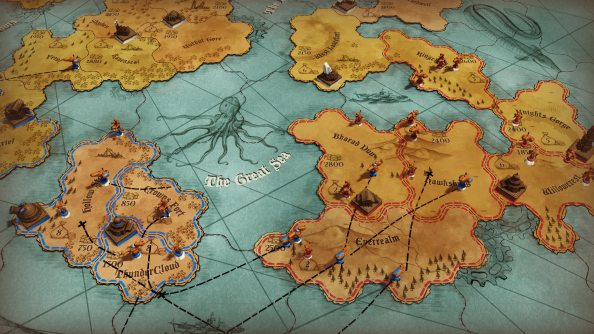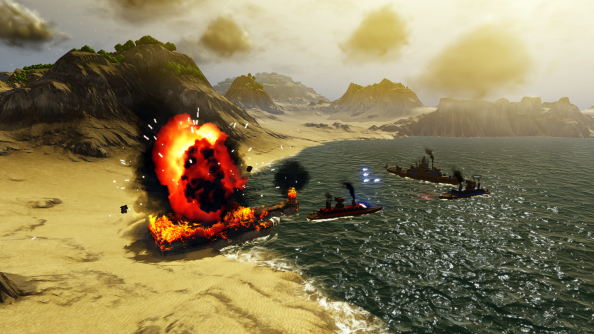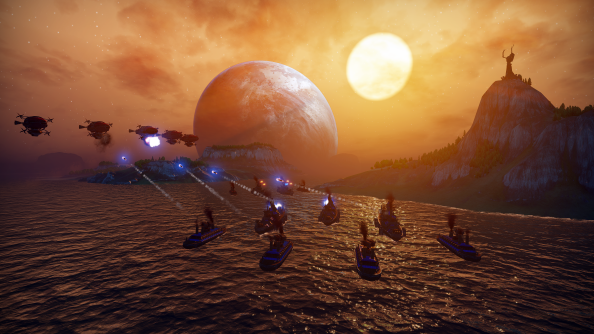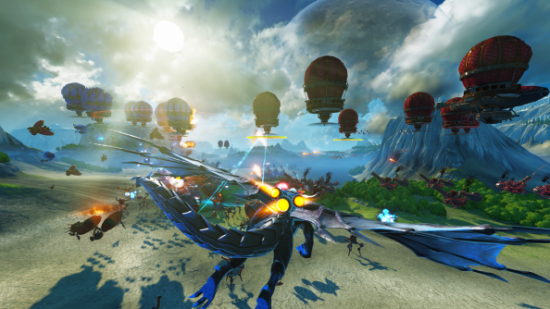Genres be damned, say Larian Studios. The developer clearly has no interest in trying to squeeze Dragon Commander into any particular category. Instead, they’ve brewed together a giant soup of genres and into this they’ve stirred a fridgeful of influences.
Anyone who dips their spoon into this bubbling broth will catch the familiar taste of real-time strategy infused with roleplaying elements and even underscored by the subtle, beefy aroma of action. There’s a faint aroma of politics in the air somewhere and also bobbing in this brew are ingredients usually associated with grand strategy board games, high fantasy and steampunk. Then, an unexpected flavour comes into the mix: while Larian don’t seem to have added elements we’d usually associate with dating sims (thank heavens), it looks like getting married is going to be an important moment in the game, something that may well be just another step along a taught political tightrope.
The strange thing is, the game that I’m most reminded of, as I sit down and start to play with a very early build, is Wing Commander. That’s not something I’m expecting since, at least on paper, Dragon Commander most closely resembles a fantasy take on the Total War series, with a turn-based strategy map cutting away to real-time conflict when enemy armies meet. But there’s a lot more going on here than that and to give their world life and character, Larian want to give their players drama as well as conflict.

Between those battles, or during the pauses when you aren’t shuttling tokens across that strategy map, Dragon Commander has you wandering about your mothership, a brassy, Victorian-style base of operations where you brush shoulders with lizards, dwarves, imps and even friendly undead. Stepping into the bar, there’s time for a chat with some of your war-weary comrades and colleagues, while searching out the resident technologist has you discussing what equipment or units you should begin research on next. Back in the map room, your advisors wait for you to make important decisions that could well affect the course of the war, and these decisions are more often economic, or even moral, than strategic.
One case in point that I saw was a ruling on, of all things, organ harvesting. While a war rages around me, my armies fighting to liberate territories left, right and centre, my advisors ask me whether I want to pass a law that allows the people who live in my realm to sell their organs for money, a very real possibility since a strong demand for the body parts of all sorts of creatures seems to have sprung up. Surely a legal trade in organs is better than a black market equivalent?

The fantasy factions that make up the world of Dragon Commander, those dwarves, elves and imps, all sit at different points on the political spectrum and my advisors give me opinions that reflect these. The capitalist dwarf talks about a free market, while the left-wing elf worries that the weak will be exploited. Whatever decision I make will have consequences down the line, affects how the races in my empire respond to me and will, without doubt, be splashed across the front page of the in-game tabloid as soon as the next edition goes to press. It’ll be right there, next to a roundup of my polling numbers.
For all the fantasy that this game is built upon, these leader decisions have been inspired by real-life events that Larian have watched unfold over the last couple of years and will have you making judgments on everything from the appropriate punishment for rioting youths to whether same-sex marriages have a place in your realm. They want being a leader to be about more than just point-and-clicking your way to war and it’s here that the political marriage part also comes into the game. Suddenly, one of your advisors tells you that your subjects expect you to tie the knot and, for political purposes, your spouse must be taken from one of the game’s non-human factions.

And yes, that does include the undead. You can, if you wish, marry an animated corpse if you want to curry favour with this powerful, if rather dessicated faction. And no, I have no idea what kind of small talk an awkward, forced relationship like this would be made up of. I didn’t get to see much of how one of these marriages works out, but I’m hoping it keeps well clear of dating sim territory and I’m encouraged that Larian say the political sides of these unions are an important consideration. Each marriage has a particular plot arc, with your spouse reacting to or clashing with your personality and your decisions, or their own skills (hopefully) complimenting your own as you forge an empire from the flames of war.
Of course, I should talk about that war itself, since it’s the event around which all your experiences will be built. Dragon Commander compliments the now standard turn-based strategy/real-time battles dichotomy with a handful of elements that the developers say were inspired by board game mechanics. While staring down at your strategic map, you hold in your hand a collection of cards that represent special powers, such as delaying tactics or production bonuses, and before a battle begins you can also lay down cards to call in extra units to fight alongside you. Naturally, it’s your choice when and where you play these cards, what to deploy now and what to hold for later.
When battle is joined, it’s immediately familiar to fans of real-time strategy and, while it does introduce a couple of new concepts, Larian aren’t pushing the envelope here. Nevertheless, it can be a busy experience with a lot of choices to make. Steampunk units, with all sorts of racial tweaks or factions-specific traits, take to the land and air and Larian want cosmopolitan armies to win the day, encouraging you to mix and match unit types as you go. For example, a fragile zeppelin works as a perfect compliment to a battleship, acting as a spotter for the vessel’s powerful, long-range guns.
If you want the job done properly, you can also do it yourself. The game offers players the chance to leap into the battles themselves, taking direct control of a jetpack-powered dragon suit and soaring above the battlefield to rain fire down upon enemy units. When this happens, the game almost transforms into third-person action and almost inevitably becomes a circle-strafing experience. It’s not yet very well-developed, but it’s not an uncomfortable addition to the game and certainly fits within the hodge-podge of other styles that Larian have mixed together.

Dragon Commander is developing into an unusual game, an interesting mix of concepts and influences that stretch all the way back to the early 90s and such old-school titles as Dune and Strike Commander. So far, I’ve seen all these disparate elements functioning perfectly well by themselves, but the real test will be how well they combine into a coherent whole and whether they build upon one another, whether a disagreement with your spouse really does reverberate around your headquarters, reshape state policy and change the course of a war. You know, I’ve heard that that sort of thing has happened to presidents and prime ministers, so I don’t see why it shouldn’t affect Dragon Commanders, too.
